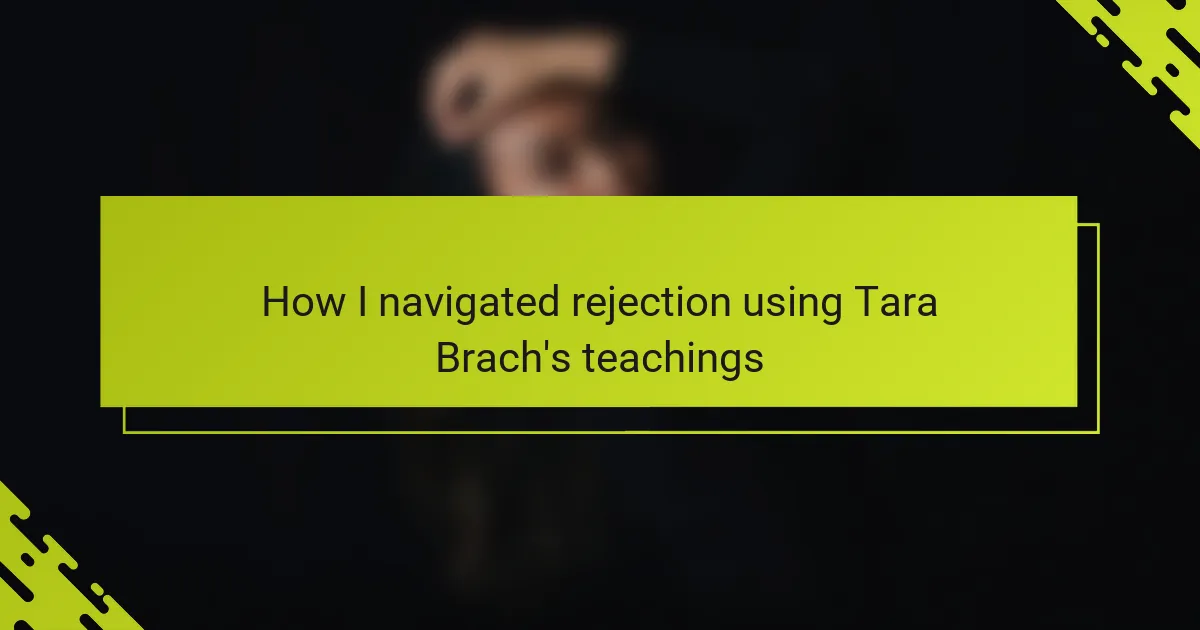Key takeaways
- Rejection in queer culture is intertwined with identity, making it feel deeply personal and challenging to cope with.
- Tara Brach’s teachings on radical acceptance and mindfulness encourage embracing pain with kindness rather than fighting against it.
- Practicing self-compassion through simple gestures and gentle phrases can transform feelings of rejection into opportunities for growth.
- Emotional awareness allows individuals to face discomfort without judgment, fostering resilience and a deeper understanding of one’s feelings.
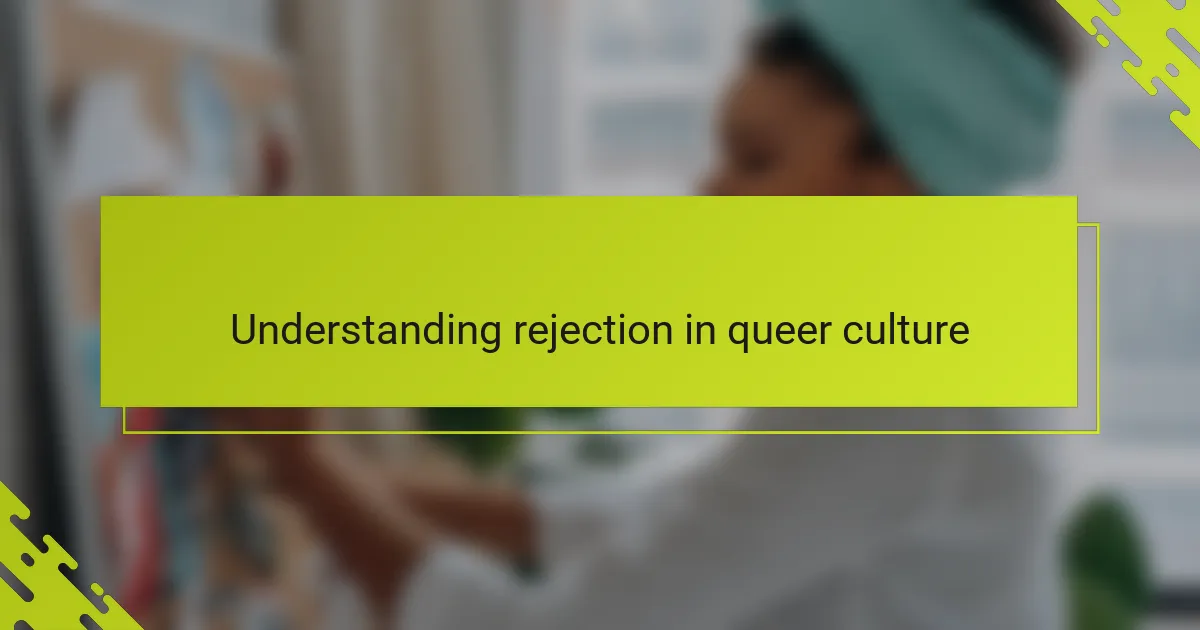
Understanding rejection in queer culture
Rejection in queer culture often feels layered, doesn’t it? It’s not just about being turned away by an individual but sometimes facing the harsh judgment of communities or even family. I remember after coming out, the sting of exclusion was more than a moment—it echoed in rooms where I had once felt safe.
What makes this rejection so complex is how deeply it intertwines with identity. When a part of who you are is dismissed, it’s not just about losing someone’s approval; it feels like losing a piece of yourself. Have you ever noticed how that kind of pain makes you question your own worth in ways that words alone can’t explain?
Yet, understanding these emotions helped me see rejection less as a final verdict and more as a painful passage. It made me realize, how often do we internalize that pain when maybe it’s just a reflection of others’ fears or misunderstandings? This shift in perspective was crucial in how I began coping—and it all started with acknowledging the unique contours of rejection in queer spaces.
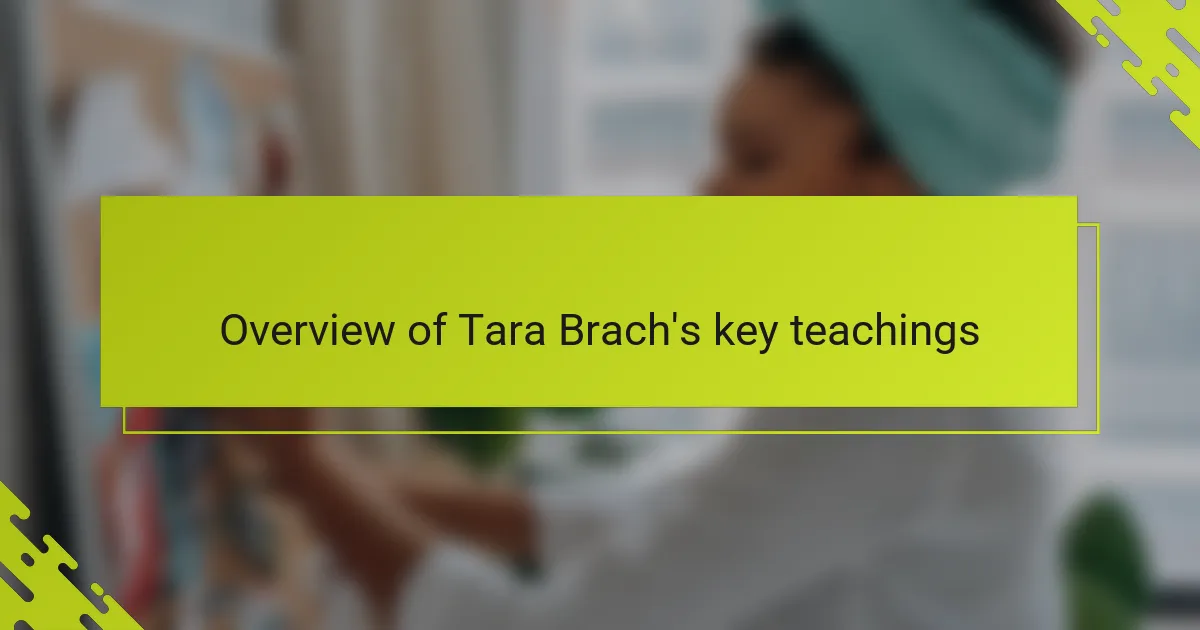
Overview of Tara Brach’s key teachings
Tara Brach’s teachings center around radical acceptance—the idea that we can hold our pain and imperfections with loving kindness rather than rejection. I found this profoundly healing; instead of fighting the sting of exclusion, I learned to sit with it, gently acknowledging the hurt without letting it define me. Have you ever tried to embrace your feelings as if they were an old friend? That’s the heart of her message.
Another cornerstone of her work is mindfulness, which invites us to fully experience the present moment without judgment. For me, this practice was a game-changer when the past’s harsh voices tried to echo in my mind. By returning to my breath and noticing sensations in my body, I could ground myself and step back from overwhelming emotions.
Tara also teaches about the “wounded heart” and how compassion—both for ourselves and others—opens the door to true healing. When I started extending kindness inward instead of criticism, rejection lost its power to isolate me. Isn’t it incredible how a little self-compassion can shift the whole narrative? This approach transformed rejection from a wall into a doorway for growth.
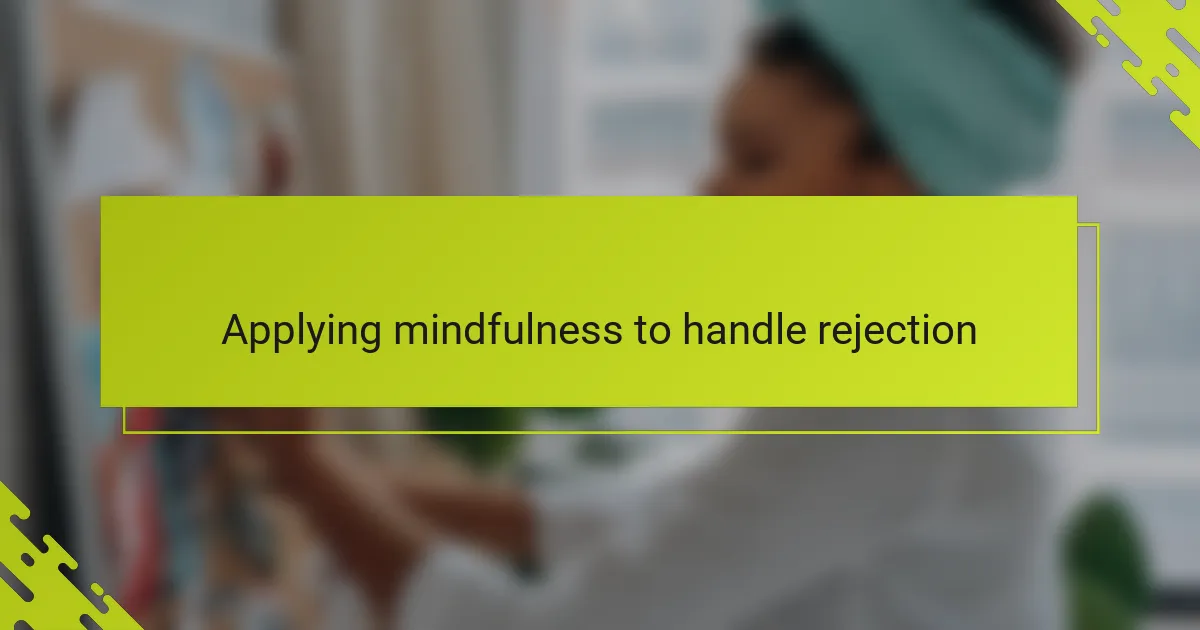
Applying mindfulness to handle rejection
When rejection hits, my mind often spirals into harsh self-judgment—that voice is relentless. But applying mindfulness, as Tara Brach suggests, helped me step out of that loop by simply noticing those thoughts without buying into them. Have you ever tried watching your feelings like a calm observer rather than diving straight into the storm?
I remember one particularly raw moment when I sat quietly, anchored in my breath, letting the ache of rejection settle without rushing to fix it. It felt counterintuitive at first, almost like surrendering. Yet in that stillness, I found a surprising softness toward myself that eased the grip of pain.
Mindfulness doesn’t erase rejection, but it creates a space where the hurt lives alongside kindness rather than conflict. This practice showed me that I could embrace my vulnerability without losing my sense of worth—something I thought rejection had stolen. How might your own experience shift if you offered yourself that same gentle witnessing?
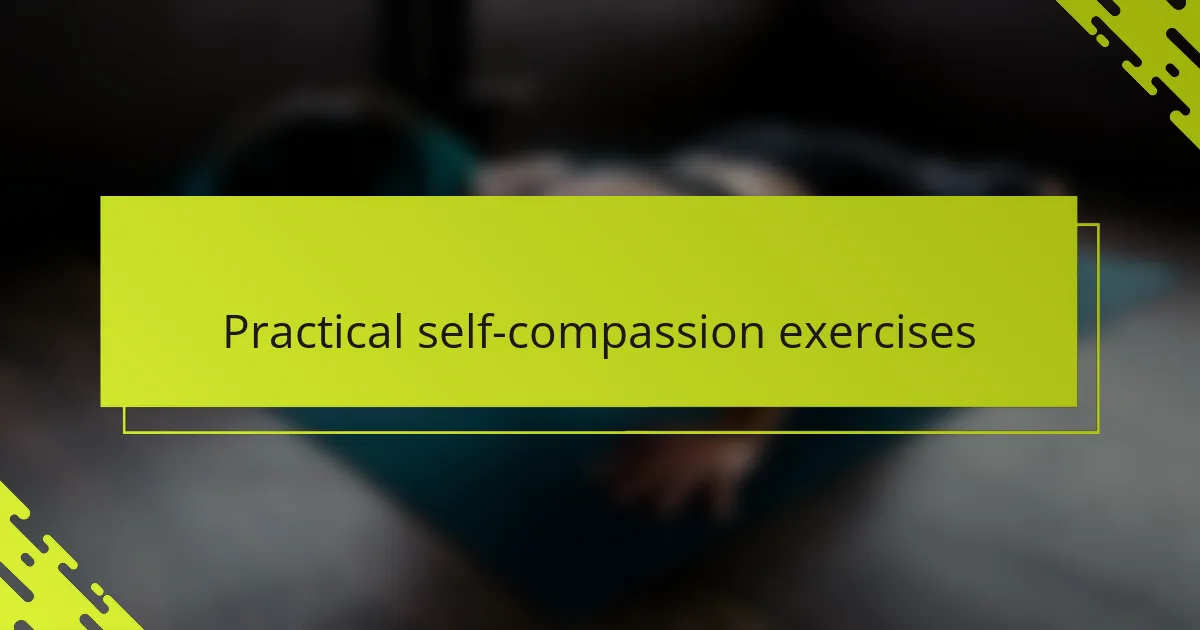
Practical self-compassion exercises
One exercise I found grounding was simply placing a hand on my heart during moments of rejection. It sounds simple, but that physical gesture reminded me to slow down and treat myself like I would a dear friend who’s hurting. Have you ever noticed how just a small act of kindness toward yourself can start to soften the tightness in your chest?
Another practice Tara Brach emphasizes is speaking to yourself with gentle phrases like, “This is painful, and I’m here for you.” At first, I felt awkward—like I was pretending—but over time, hearing those words internally became a balm. It shifted my inner dialogue from harsh judgement to gentle presence, showing me that self-compassion isn’t about ignoring pain but holding it tenderly.
One night, after a particularly rough day of feeling unseen, I tried a loving-kindness meditation focusing on myself. As I repeated phrases of care and goodwill, tears came unbidden—not from despair but from relief. That moment made me realize how deeply I craved compassion from within, and practicing these small exercises helped me rebuild my sense of belonging one breath at a time. Have you ever given yourself permission to feel that kind of tenderness?
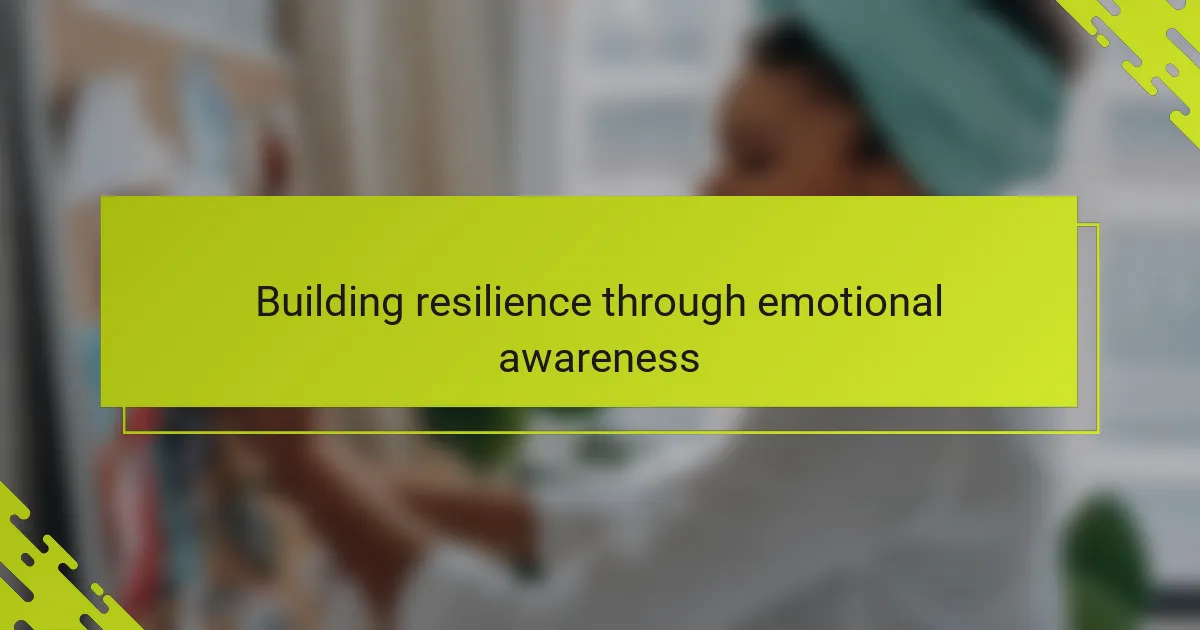
Building resilience through emotional awareness
When I started paying close attention to my emotions during moments of rejection, something shifted inside me. Instead of pushing away the pain, I invited myself to notice it—its weight, its texture, even its rhythm. Have you ever tried to just be with your hurt, like you would with a close friend who needs to be heard? That simple awareness became the first step in building resilience for me.
Emotional awareness felt like learning a new language, one that taught me to translate feelings into understanding rather than fear. I recall a time when the sting of exclusion made my chest tighten so much that I thought I’d choke. Instead of running from that sensation, I focused inward and acknowledged the anxiety without judgment. That act alone loosened the grip of despair and made me realize resilience isn’t about ignoring pain—it’s about befriending it.
What surprised me most was how emotional awareness created a foundation for kindness towards myself. Once I could recognize sadness or anger as signals—not enemies—I began to respond with patience rather than criticism. How often do we mistake discomfort for failure, when it’s actually an invitation to grow stronger inside? This awareness didn’t erase the challenges, but it gave me the power to move through them with more grace.
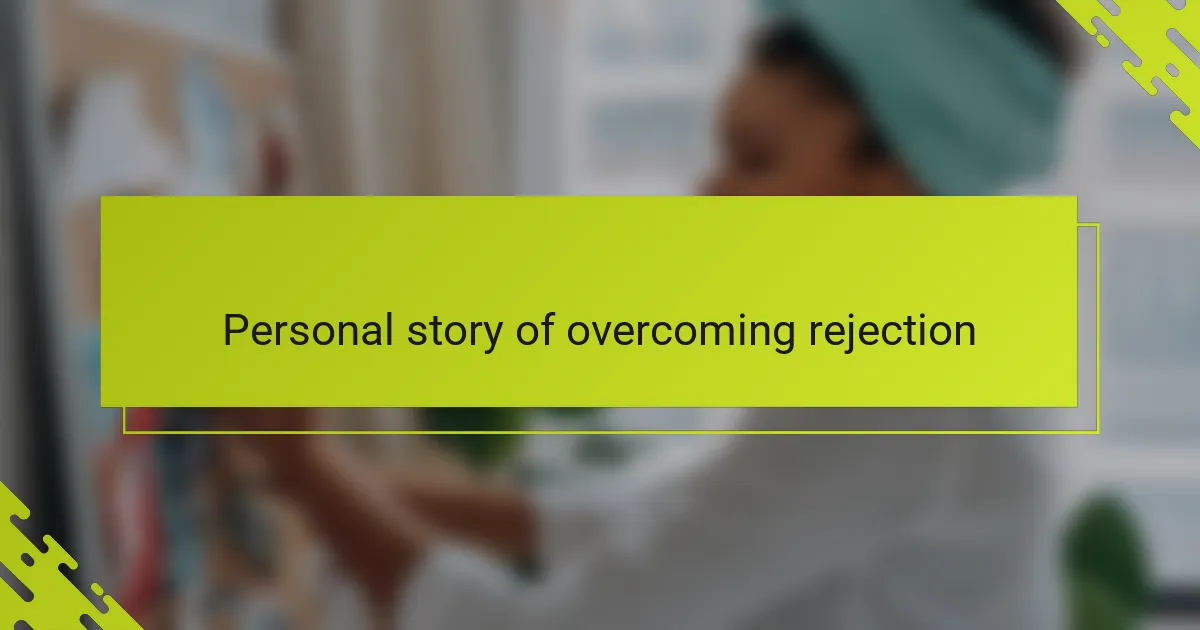
Personal story of overcoming rejection
There was a moment not long after I first faced rejection where the weight of it felt unbearable, like I was carrying an invisible wound no one else could see. I remember sinking into the quiet of my room, heart racing with a whirlwind of “Why me?” and “What did I do wrong?” That night, I realized how deeply rejection could shake the foundation of my sense of self, especially within queer spaces where acceptance often feels hard-won.
Instead of pushing those feelings away, I began to experiment with sitting alongside them, drawing from the gentle acceptance Tara Brach teaches. It wasn’t easy at first—I kept expecting the pain to vanish if I ignored it. But by gently acknowledging that ache without judgement, I found it softened just enough to breathe through. Have you noticed how simply naming your pain can start to take away its power?
One of the most memorable shifts came when I stopped fighting my emotions and started embracing my vulnerability. I caught myself saying, “It’s okay to feel hurt; you’re not alone,” as if comforting a dear friend. That simple internal dialogue sparked a quiet resilience I didn’t know I had. It made me wonder: what if we all treated ourselves with the same kindness we so freely offer others?
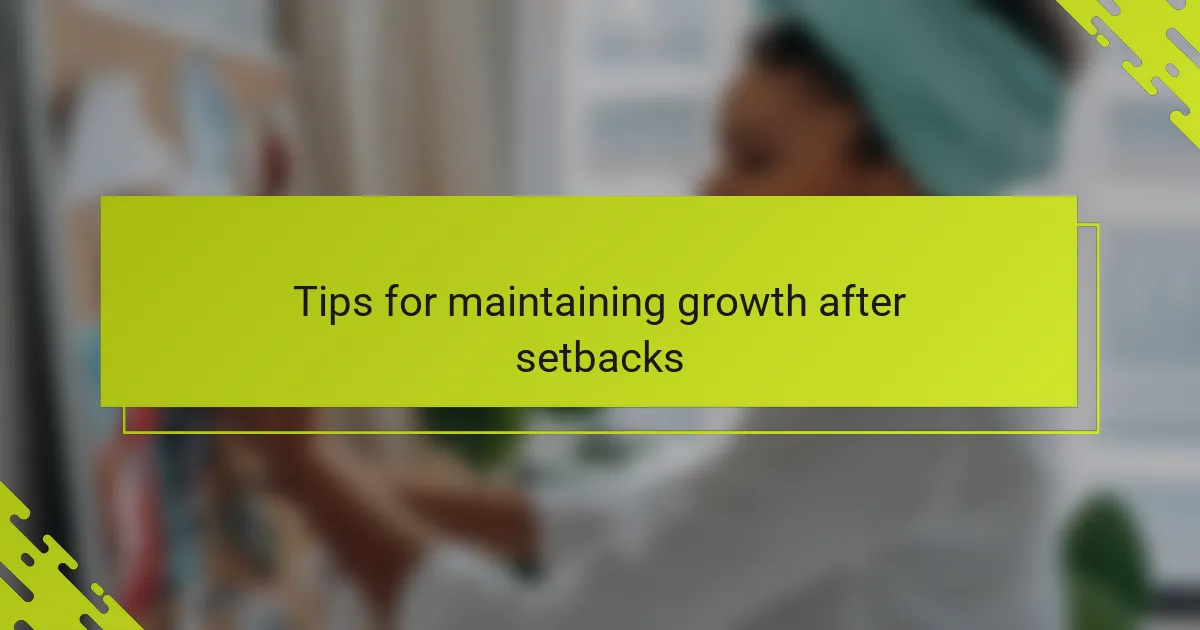
Tips for maintaining growth after setbacks
After setbacks, I found that staying curious about my feelings was key. Instead of rushing to “fix” the pain, I asked myself, “What’s this teaching me right now?” That shift—from resisting to learning—kept my growth alive even when things felt raw.
Sometimes, I turned to simple rituals to anchor my progress. For example, journaling became a way to track not just the challenges but the small wins of self-compassion and courage. Have you ever noticed how writing down a single kind thought about yourself can spark a gentle wave of hope?
Most importantly, I reminded myself that growth isn’t linear—it’s perfectly okay to wobble and revisit old wounds. Tara Brach’s teachings helped me embrace setbacks as part of the journey, not a sign of failure. When I catch myself blaming or doubting, I pause and ask, “How can I hold this moment with kindness instead?” That question often opens a door to new strength.
